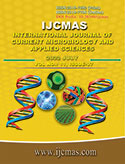


 National Academy of Agricultural Sciences (NAAS)
National Academy of Agricultural Sciences (NAAS)

|
PRINT ISSN : 2319-7692
Online ISSN : 2319-7706 Issues : 12 per year Publisher : Excellent Publishers Email : editorijcmas@gmail.com / submit@ijcmas.com Editor-in-chief: Dr.M.Prakash Index Copernicus ICV 2018: 95.39 NAAS RATING 2020: 5.38 |
Root-knot nematodes (RKN) are notorious to cause root galls and leads to severe damage on different crops, including mulberry. RKN have very wide host range and Meloidogyne is a universal problem due to its polyphagous nature. Molecular diagnosis at species level is more efficient than the morphological identification of RKN. Hence, in this study, two methods were used for isolation of nematode DNA using root galls of mulberry. Between these, the modified CTAB extraction method yielded a high quantity of DNA (1244.8 to 7031.4 ng/µl), with spectrophotometer reading at A260 / A280 ratio ranged between 1.62 to 1.96 for purity. Further, the DNA was subjected to PCR amplification using Meloidogyne species specific markers. The best amplification was observed in DNA isolated from the modified CTAB method. The genus and species-specific markers were used for accurate detection of RKN samples collected from three mulberry growing states of South India. The amplicon size at 612 bp and 399 bp confirmed the presence of genus Meloidogyne and species M. incognita, respectively in all the samples. Further, amplified regions of 28S rDNA and SCAR were sequenced to confirm the identification of the RKN. This study revealed the association of M. incognita in mulberry root-knot nematode at the molecular level in South India.
 |
 |
 |
 |
 |